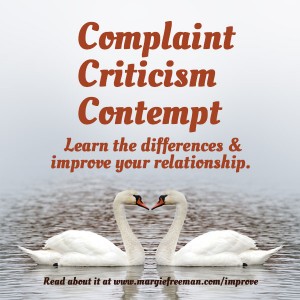 How we communicate our displeasure can make all the difference in the world to the quality of your relationship. John Gottman (Why Marriages Succeed or Fail) points out the distinctions between a complaint, a criticism, and contempt.
How we communicate our displeasure can make all the difference in the world to the quality of your relationship. John Gottman (Why Marriages Succeed or Fail) points out the distinctions between a complaint, a criticism, and contempt.
A complaint is a specific statement of distress, displeasure, or anger. A criticism is more global, less specific. When you complain, you are referring to a particular action (or lack of action). When you criticize, you are attacking the character of the person.
For example, a complaint is: ” I am disappointed that you did not make plans for us to go out last Saturday night.” A criticism is: “You never make plans for us to go out.”
Contempt has the intention of insulting your partner. You are stabbing into the heart of your partner’s sense of self with words and body language. Contempt can involve insults, name-calling, and/or mockery. Some signs of contempt are communicated with body language: sneering, rolling your eyes, glaring, etc.
An example of contempt would be: “You are such a passive and selfish bastard, you can’t be bothered with asking me out.” Contempt (and disgust) can overwhelm a relationship, are toxic to the ongoing health of the relationship, and should be banned from couple interactions.
Complaints are necessary to maintain long-lasting relationships. Your must communicate what is troubling you authentically and honestly. If criticism becomes pervasive, and if your partner is sensitive to it, it can corrode the relationship.
Your relationship will improve if you you approach your partner with specific complaints rather than attacking your partner’s character. Criticism and contempt need to be countered with compliments and expressions of mutual admiration if you want your relationship to succeed. Learning how you communicate can make all the difference in the world!
